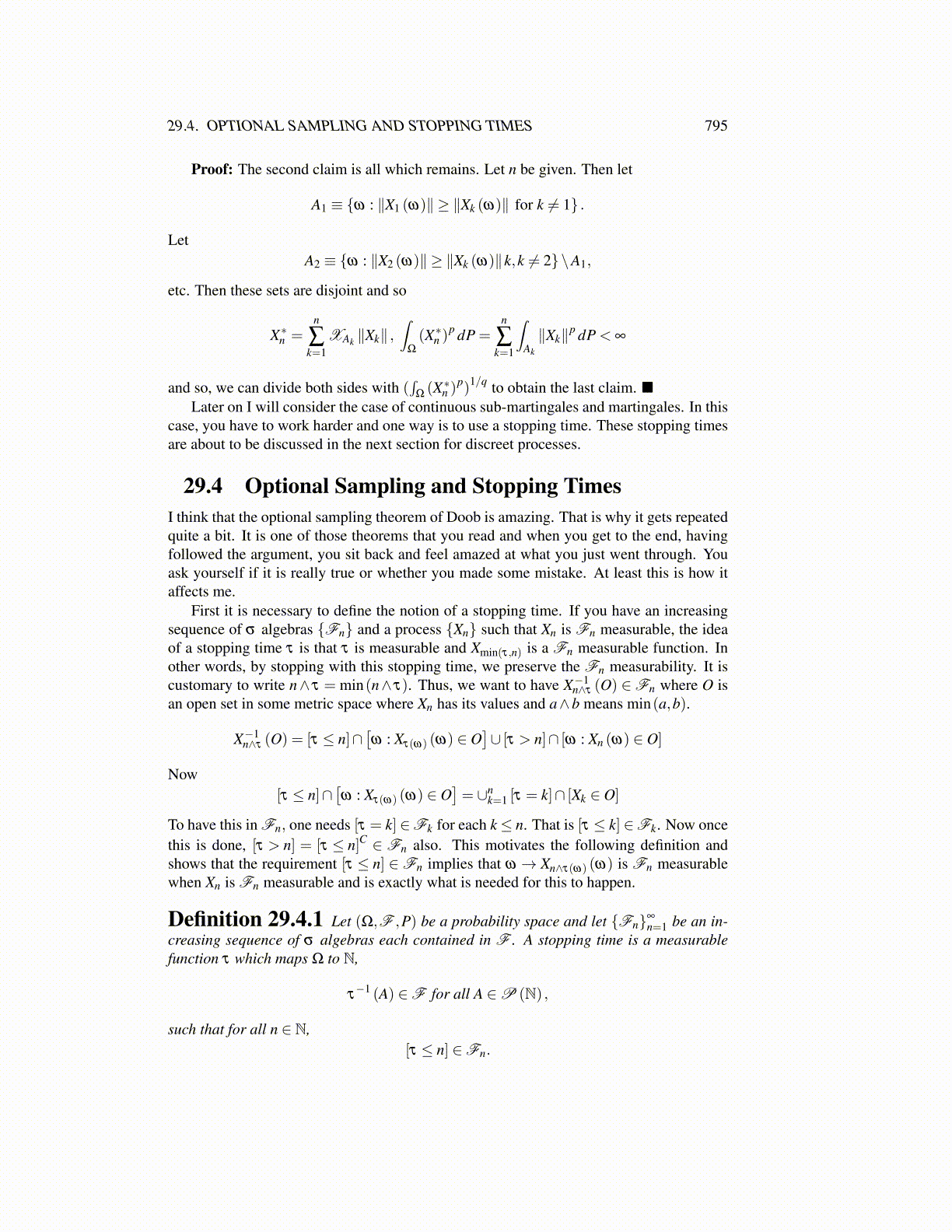
29.4. OPTIONAL SAMPLING AND STOPPING TIMES 795
Proof: The second claim is all which remains. Let n be given. Then let
A1 ≡ {ω : ∥X1 (ω)∥ ≥ ∥Xk (ω)∥ for k ̸= 1} .
LetA2 ≡ {ω : ∥X2 (ω)∥ ≥ ∥Xk (ω)∥k,k ̸= 2}\A1,
etc. Then these sets are disjoint and so
X∗n =n
∑k=1
XAk ∥Xk∥ ,∫
Ω
(X∗n )p dP =
n
∑k=1
∫Ak
∥Xk∥p dP < ∞
and so, we can divide both sides with (∫
Ω(X∗n )
p)1/q to obtain the last claim. ■
Later on I will consider the case of continuous sub-martingales and martingales. In thiscase, you have to work harder and one way is to use a stopping time. These stopping timesare about to be discussed in the next section for discreet processes.
29.4 Optional Sampling and Stopping TimesI think that the optional sampling theorem of Doob is amazing. That is why it gets repeatedquite a bit. It is one of those theorems that you read and when you get to the end, havingfollowed the argument, you sit back and feel amazed at what you just went through. Youask yourself if it is really true or whether you made some mistake. At least this is how itaffects me.
First it is necessary to define the notion of a stopping time. If you have an increasingsequence of σ algebras {Fn} and a process {Xn} such that Xn is Fn measurable, the ideaof a stopping time τ is that τ is measurable and Xmin(τ,n) is a Fn measurable function. Inother words, by stopping with this stopping time, we preserve the Fn measurability. It iscustomary to write n∧ τ = min(n∧ τ). Thus, we want to have X−1
n∧τ (O) ∈Fn where O isan open set in some metric space where Xn has its values and a∧b means min(a,b).
X−1n∧τ (O) = [τ ≤ n]∩
[ω : Xτ(ω) (ω) ∈ O
]∪ [τ > n]∩ [ω : Xn (ω) ∈ O]
Now[τ ≤ n]∩
[ω : Xτ(ω) (ω) ∈ O
]= ∪n
k=1 [τ = k]∩ [Xk ∈ O]
To have this in Fn, one needs [τ = k]∈Fk for each k≤ n. That is [τ ≤ k]∈Fk. Now oncethis is done, [τ > n] = [τ ≤ n]C ∈ Fn also. This motivates the following definition andshows that the requirement [τ ≤ n] ∈Fn implies that ω → Xn∧τ(ω) (ω) is Fn measurablewhen Xn is Fn measurable and is exactly what is needed for this to happen.
Definition 29.4.1 Let (Ω,F ,P) be a probability space and let {Fn}∞
n=1 be an in-creasing sequence of σ algebras each contained in F . A stopping time is a measurablefunction τ which maps Ω to N,
τ−1 (A) ∈F for all A ∈P (N) ,
such that for all n ∈ N,[τ ≤ n] ∈Fn.